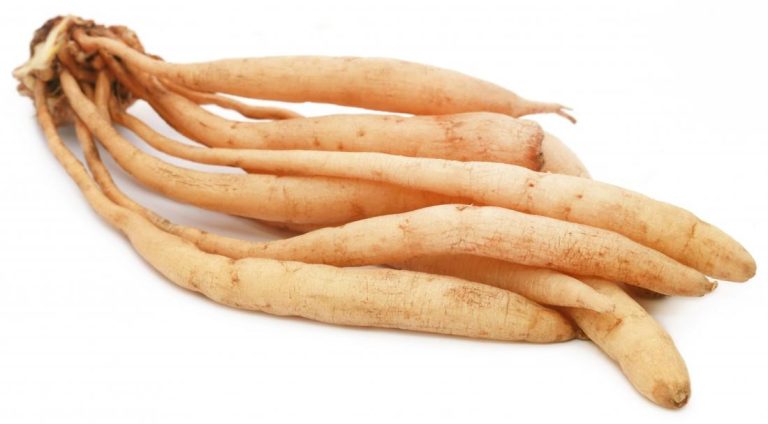Shatavari
Shatavari
Asparagus racemosa
Shatavari is a member of the asparagus family. Soft, feathery, thin and striated Shatavari leaves grow in rainy season. Shatavari roots are adventitious, fleshy, fibrous and tuberous. They taper at both ends, can grow up to 1 meter and 100 in number. This is the plant-part that is used for as medicine and supplement in Ayurveda. The fleshy Shatavari roots have the capacity to capture and store moisture adapting to dry soils and climate, which reflects its potential for nurturing the human body in crisis. This root forms an ingredient of nourishing Pakas (sugar based products) in Ayurveda. The Shatavari plant is commonly found in many parts of tropical India and Asia. Shatavari is bitter and slightly sweet in taste, cool in nature and vata-pitta-ghna i.e. it pacifies Vata and Pitta doshas.
वृष्या रसायनवरा स्मृता…..


Shatavari in Sanskrit is known by Shatamuli, Bahu-suta or Bahu-putra, Narayani, Shatavirya, Shukshma-patra, Atirasa, etc. names. The word ‘Shatavari or Shatamuli’ means the one which has multiple (hundred) roots. It expands extensively, hence named ‘Bahu-suta or bahu-putra’. Historically it is known to be derived from Lord Narayan i.e. Vishnu, hence called ‘Narayani’. The Shatavari is referenced since the season of Puranas. There are references of Shatavri in Agnipurana with respect to its Rakshoghna property and utilization in Homas (rituals). Taittariya Arnyaka has portrayed an herb ‘Shatamula’ which is accepted to be Shatavari. It has been placed in Balya (strength promoting) and Vayasthapan (longevity promoting) groups of medicinal herbs.
Health Benefits from Shatavari:
Shatavari is classically documented as the best Rasayan by ancient seers. Shatavari has a cooling effect on the body. It possesses unctuous and oleate properties, which makes it beneficial for great support in building, nourishing and grounding effect. The combination of sweet and bitter tastes give it an energetic edge to pacify excess Vata and Pitta doshas. It is beneficial in fatigue, bleeding disorders, abdominal tumors, diarrhea-dysentery, Irritable Bowel Syndrome and eye disorders.
- Promotes a healthy reproductive system
- Immuno-modulatory
- Immuno-stimulant
- Improves brain function and acts as neuro-protective
- Beneficial in the management of stress, inflammatory conditions and stress-related immune disorders
- Improves the general state of health
- Cardio-tonic, improves the strength of pumping action of the heart and regulates rhythm
- Stimulates the digestive power and improves digestion
- Gastro-protective and beneficial in ano-rectal disorders.
- Promotes gastric emptying; reduces both severity of ulceration and ulcer index.
Shatavari for Female Reproductive Health:
- Shatavari nourishes all dhatuse. vital tissues in body and acts as an aphrodisiac. It has testosterone-like effect on the reproductive system.
- It helps gain weight and nourish reproductive organs in underweights.
- Shatavari is said to be an excellent galactagogue. It increases production, secretion i.e. quality, and quantity of breastmilk.
- It helps to increase prolactin secretion, which is beneficial for development of mammary glands, produce milk during pregnancy and secrete it after birth.
- Shatavari helps reduce contractions in the uterus and acts as a uterine sedative. It increases libido, beneficial for reproductive system, enhances folliculo-genesis and ovulation.
- It is beneficial in female infertility, as it prepares the womb for conception and prevents miscarriages.
- It acts as post-pregnancy tonic by increasing lactation and normalizing the uterus. Its use is also advocated in leucorrhoea and menorrhagia.
Shatavari for Male Reproductive Health:
- Shatavari serves as a powerful tonic.
- Its helps balance and aid other herbs having hot potency beneficial to improve sperm count.
- It prevents erectile dysfunction and lowering of sperm-count caused by excess accumulation of pitta and oxidation.
- Shatavari’s medhya i.e. nerve stimulating properties help enhance libido, mediate male reproductive functions.
- It is beneficial in general fatigue, low sexual energy, inflammation, hyperacidity, urogenital infections, burning sensations, disturbing emotions like anger, irritability, stress, anxiety and depression.
Shatavari for Adaptogenic Properties:
Shatavari possesses adaptogenic properties. It is referred to as the ‘queen of herbs’. With its fertility-toning and nervous system-restoring qualities, Shatavari helps support and nourish the body. It helps restore depleted vitality stores and cope with physical and emotional stress. It promotes fertility and restores essential functions.
Shatavari for Immunity:
Shatavari is described as ‘The Best Rasayan’ i.e. immunity-enhancer, by ancient seers. It stimulates the immune cells in your body and boosts immunity in case of infections and diseases. By virtue of immune-adjuvant properties, Shatavari stimulates the immune response, enhances the ability to fight infections and promotes health.
Shatavari for Weight-gain:
Shatavari helps gain weight in underweights. It improves digestion by flushing out the toxins that affect digestion and cause underweight or weight-loss. Improvement in digestion and toxin cleansing helps in nourishment of vital tissues and overall growth & development of body.
Shatavari for Urinary Health:
Shatavari possesses diuretic properties and helps reduce the excess fluid in the body. It helps reduce the fluid imbalance in cardiac system and lower the risk of heart attack and heart failure. Shatavari consumed with cold water helps correct dysuria or urinary disorders. Shatavari fortified with Gokshur and milk is beneficial in hematuria i.e. blood in urine.
How to use Shatavari:
- Shatavari acts as ovulation-inducing herb, when fortified with milk or ghee
- Shatavari juice with honey relieves leucorrhoea
- Shatavari fortified with milk increases the breast-milk secretion, as it acts as a galactagogue
- Shatavari juice fortified with milk and Ghee; mixed with honey, sugar and long pepper acts as an aphrodisiac
- Shatavari roots boiled in milk helps relieve bilious dyspepsia, diarrhea and promotes appetite
- Fresh Shatavari root juice with honey relieves irritation and inflammation
- Shatavari and Gokshur boiled in milk helps relieve hematuria
- Shatavari Churna (powder) consumed with milk helps reduce blood in stools and relieve piles
Shatavari offerings from Sandu:
Shatari: is an Ayurvedic formulation beneficial to all new mother’s to support her during the breast-feeding phase.
Balant Kadha No. 3: is an Ayurvedic formulation beneficial for increasing immunity and lactation in mothers. It imparts post-delivery strength, helps relieve complications like fever, cold, indigestion, IBS, pain, etc.
Preg-utero: is a Proprietary Ayurvedic Formulations which acts as a complete tonic for women during pregnancy. It is a complete nutritional regimen beneficial for the growth of fetus & act as natural tonic to both developing fetus and pregnant mothers. It is useful for common complaints during pregnancy.
Tejras: is an Ayurvedic Proprietary Formulations beneficial for improving concentration, alertness and memory especially for children.
Stresan: is a proprietary Ayurvedic formulation that is a non-addictive and natural mood stabilizer as well anxiety reliever.
Brahmihita: is a soothing and calming Ayurvedic oil beneficial for nervous disorders, vision and hair growth. It helps relieve mental stress, fatigue, anxiety, headache and insomnia.
Saraswatarishta: is an Ayurvedic hydro-alcoholic formulation for complete neuro-muscular health.
Mahamanjishthadi Kadha: is an Ayurvedic formulation excellent in various skin disorders and complaints.
Citations:
- Akshay K. Singh*, Anjali Srivastava, Vivek Kumar and Karunakar Singh, “Phytochemicals, Medicinal and Food Applications of Shatavari (Asparagus racemosus): An Updated Review”, The Natural Products Journal 2018; 8(1) . https://doi.org/10.2174/2210315507666170922145258
- Kaaria, Linet Mwende, et al. “Effect of Asparagus racemosus on selected female reproductive parameters using Wistar rat model.” Discovery Phytomedicine4 (2019): 199-204.
- Mandal, S. C., et al. “Evaluation of antibacterial activity of Asparagus racemosus Willd. root.” Phytotherapy Research2 (2000): 118-119.
- Lalert, Laddawan, et al. “Neuroprotective effect of Asparagus racemosus root extract via the enhancement of brain-derived neurotrophic factor and estrogen receptor in ovariectomized rats.” Journal of ethnopharmacology 225 (2018): 336-341.
